Time Management Books
In our modern era, where distractions abound and time is a precious commodity, mastering time management is essential for achieving success that why we have reviews the 5 best Time Management books for you. Fortunately, Amazon offers a treasure trove of resources to help individuals optimize their productivity and make the most of their time.
In this extensive guide, we’ll examine Amazon’s top 5 bestsellers in time management, offering a detailed overview of each product’s features, benefits, and the reasons they have received praise from thousands of satisfied customers.
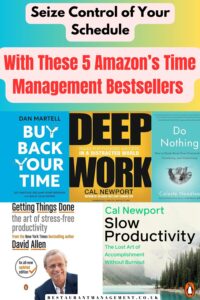
Best Sellers in Time Management
#1 Buy Back Your Time: Get Unstuck, Reclaim Your Freedom, and Build Your Empire
Dan Martell
4.8 out of 5 stars 443
Audible Audiobook
£11.37
Buy Back Your Time by Dan Martell is a helpful and inspirational guide for people who feel overburdened by their schedules. With a nearly perfect 4.8-star rating from 443 reviews, this book speaks to busy professionals and entrepreneurs, recognising their struggles and providing a solution to free up time for the things that really count.
Martell’s work is both readable and captivating, and it is available as an Audible audiobook for £11.37. He offers helpful tips on outsourcing, delegating, and rearranging priorities to maximise productivity, all based on his own experience. His focus on designing life with intention rather than falling into constant busyness makes this audiobook especially impactful, empowering readers to take control of their time.
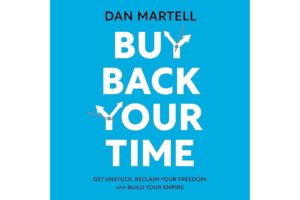
However, some readers argue that the overemphasis on entrepreneurship limits its appeal to those outside the business world. Others find the advice somewhat familiar within the self-help genre. Still, Martell’s storytelling and actionable tools make this a valuable resource for those ready to challenge how they spend their time and build a more purposeful life.
#2 Deep Work: Rules for Focused Success in a Distracted World
Cal Newport
4.6 out of 5 stars 31,161
Audible Audiobook
Get the Audible audiobook for the reduced price of £7.49 after you buy the Kindle book.
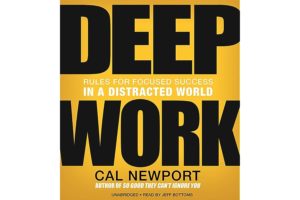
“Deep Work: Rules for Focused Success in a Distracted World” by Cal Newport has garnered widespread acclaim, evidenced by its impressive rating of 4.6 out of 5 stars from over 31,000 reviews. In this insightful audiobook, Newport offers a compelling manifesto for navigating the complexities of the modern work environment with clarity and purpose.
At £15.95, the audiobook edition provides accessible access to Newport’s transformative ideas, making it an attractive option for those seeking to optimise their productivity and achieve meaningful results. By conducting thorough research and offering practical advice, Newport examines the concept of “deep work” – the skill of concentrating on demanding tasks without interruption – and its profound effects on professional success and personal fulfilment.
Listeners are guided through actionable strategies for cultivating deep work habits in an age of constant distraction. Newport’s persuasive argument and compelling anecdotes serve as a rallying cry for reclaiming one’s cognitive autonomy and unlocking the full potential of focused concentration. Whether you’re a student, entrepreneur, or seasoned professional, “Deep Work” offers invaluable insights for mastering the art of deep focus in a world fraught with distractions.
Common criticisms of “Deep Work: Rules for Focused Success in a Distracted World” by Cal Newport:
While Newport advocates for deep work – uninterrupted, focused work on cognitively demanding tasks – some critics argue that his approach may be overly rigid or impractical for certain professions or work environments. They suggest that complete disconnection from distractions like email and social media may not be feasible or desirable for everyone.
Critics contend that Newport’s contrast between deep and shallow work may need to be more balanced with the complexities of modern work environments. They argue that not all tasks can be neatly categorised as deep or shallow, and some may require a blend of both types of work.
While Newport provides compelling examples of individuals in knowledge-based professions benefiting from deep work, some critics question the book’s relevance to workers in other industries or roles. Newport’s recommendations may be less applicable or practical for individuals in fields that require frequent collaboration or physical labour.
Critics argue that Newport’s focus on individual behaviour and habits overlooks the structural barriers that may prevent people from engaging in deep work, such as workplace policies, organisational culture, and socioeconomic factors. They contend that addressing these systemic issues is necessary for promoting deep work on a broader scale.
Some critics express concerns that Newport’s emphasis on deep work and productivity may inadvertently contribute to a culture of overwork and burnout. They caution against equating success solely with productivity metrics and advocating for a more balanced approach that prioritises well-being and sustainable work practices.
“Deep Work” offers valuable insights into the importance of focused concentration in an age of distraction, Before embracing its principles, readers ought to critically evaluate its recommendations and consider their unique circumstances and preferences.
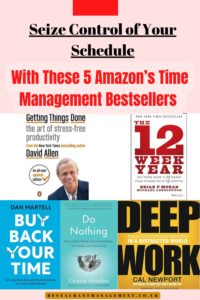
#3 Essentialism: The Disciplined Pursuit of Less
Greg McKeown
4.6 out of 5 stars 12,201
Paperback
£9.99
Greg McKeown’s Essentialism:The Disciplined Pursuit of Less has received a great deal of praise, with more than 12,000 readers giving it an astounding 4.6 out of 5 stars. This modern classic offers a ray of simplicity and clarity in both personal and professional life, striking a chord with people who are struggling with overwhelm and distraction.
McKeown’s book, which costs £9.99 in paperback, is an inspirational guide that emphasises the idea that ” less, but better” ought to direct choices. He encourages readers to cut out unnecessary things, concentrate on what is really important, and make time for worthwhile work by providing real-world examples and practical exercises.
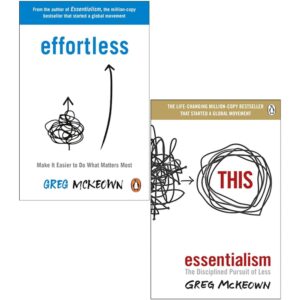
The book’s straightforward writing style and familiar experiences make it both informative and inspiring.
While some critics argue that the book’s advice is redundant or unduly basic and that it does not always provide tangible measures for implementing essentialism in complicated, fast-paced contexts, its central message is indisputably strong.
Essentialism, as advocated by McKeown, underscores that clarity, focus, and intentionality are the keys to both productivity and fulfilment.
#4 Slow Productivity: The Lost Art of Accomplishment Without Burnout
Cal Newport
4.7 out of 5 stars 2,031
Hardcover
£22.50
In a society that exalts hustling, Cal Newport’s Slow Productivity is a welcome change. With thousands of five-star ratings, it’s obvious that this book appeals to those who are fed up with the status quo and seek a more healthful way to accomplish their goals.
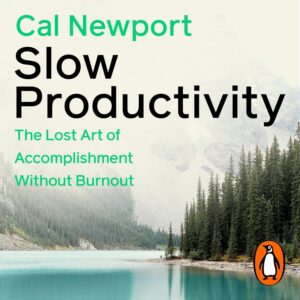
For £22.50 in hardcover, you get Newport’s thoughtful take on why actual productivity isn’t about doing more, faster—it’s about producing meaningful work without sacrificing your wellbeing. Drawing on history, research, and his own insights, he shows that slowing down can actually lead to deeper focus, higher quality, and more fulfilment.
Not every reader is convinced, though. While some think the concepts are a little overdone, others believe the book may provide more useful advice for jobs that move quickly. Nonetheless, this book is a comforting and motivating guide if you’re seeking a remedy for burnout and a more deliberate approach to work.
#5 Getting Things Done: The Art of Stress-Free Productivity
David Allen
4.5 out of 5 stars 9,486
Paperback
£6.20
David Allen’s “Getting Things Done: The Art of Stress-Free Productivity” earned a rating of 4.5 out of 5 stars from a substantial pool of 9,486 reviewers. Available in paperback format for $12.49, Allen’s book offers a comprehensive system for enhancing productivity and reducing stress in both professional and personal realms.
In “Getting Things Done,” Allen presents a pragmatic approach to task management rooted in clarity, control, and focus. By providing a systematic framework for capturing, organising, and executing tasks, Allen empowers readers to achieve “stress-free productivity.” He guides readers towards greater efficiency and effectiveness in their daily endeavours through practical strategies and psychological insights.
Whether you’re struggling to manage a hectic workload or simply seeking to streamline your workflow, “Getting Things Done” offers invaluable guidance for mastering the art of productivity. Allen’s timeless principles and actionable advice make this book a must-read for anyone looking to reclaim control over their time and achieve greater peace of mind amidst life’s demands.

Common criticisms of “Getting Things Done: The Art of Stress-Free Productivity”
Critics argue that while Allen’s GTD methodology offers a comprehensive system for managing tasks and reducing stress, it can be overly complex and time-consuming. Some readers may need help with the system’s intricate organisational methods, especially when integrating them into existing workflows.
While GTD works well for many individuals, some critics argue that Allen’s system may not be flexible enough to accommodate different work styles or preferences. The rigid structure of the methodology may only resonate with some, leading to frustration or resistance among readers who prefer more fluid approaches to productivity.
Critics suggest that Allen’s focus on the process of organising tasks and managing workflows may overshadow the importance of focusing on meaningful goals and priorities. Some readers may get bogged down in the details of GTD’s implementation, losing sight of the bigger picture and their overarching objectives.
While GTD is effective for managing routine tasks and projects, critics argue that it may not be well-suited for more creative or ambiguous work. The system’s emphasis on categorising tasks and breaking them down into actionable steps may not align with the nonlinear nature of certain types of work, leading to frustration or inefficiency.
In the digital age, Allen’s GTD methodology has been adapted into numerous productivity apps and software tools. However, critics argue that the proliferation of digital tools may lead to a dependence on technology that detracts from the original intention of GTD, which is to simplify and streamline productivity processes.
While Time Management books such as “Getting Things Done” offers valuable insights into personal productivity and stress reduction, readers should approach the book critically and consider its limitations in the context of their own work habits and preferences. Supplementing GTD with additional strategies and techniques may enhance its effectiveness in achieving stress-free productivity.
Related articles:
How To Improve Restaurant Profits
Restaurant Management Structure
Conclusion
In wrapping up, exploring Amazon’s bestselling time management books reveals how much people crave control, clarity, and balance in their lives. From Greg McKeown’s rigorous reminder that “less is more” to Dan Martell’s inspiring exhortation to “buy back your time” and Cal Newport’s novel perspective on slowing down to avoid burnout, these time management books show many routes to the same goal: a more purposeful and satisfying use of time.
Each offers unique insights—whether it’s practical strategies for entrepreneurs, guidance on focusing energy where it matters most, or encouragement to rethink productivity altogether.
Yet, as with any advice, it’s essential to approach these books with both curiosity and discernment. What resonates deeply with one person may not fit another’s lifestyle, profession, or goals. Time management is not a one-size-fits-all solution—it’s a personal journey shaped by priorities, responsibilities, and values.
Ultimately, the biggest lesson from these bestsellers is that time is our most precious resource, and the way we choose to spend it determines the quality of our life. By applying the principles that align with your needs, you can move closer to achieving not just productivity, but also purpose, balance, and long-term fulfilment.



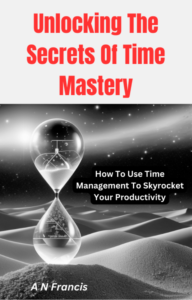
Your blog has quickly become one of my favorites. Your writing is both insightful and thought-provoking, and I always come away from your posts feeling inspired. Keep up the phenomenal work!
That really means a lot – thank you! I’m glad the posts are sparking inspiration for you, and I’ll continue to do my best to deliver content that’s worth your time. Appreciate the encouragement! 🙌
I’ve been following your blog for quite some time now, and I’m continually impressed by the quality of your content. Your ability to blend information with entertainment is truly commendable.
Thank you very much; it truly means a lot to me. I put a lot of effort into ensuring that what I share is both useful and enjoyable, so I’m glad to hear that it’s being appreciated. Thank you for your support and for keeping up with my updates. Don’t forget to sign up for our email subscription!